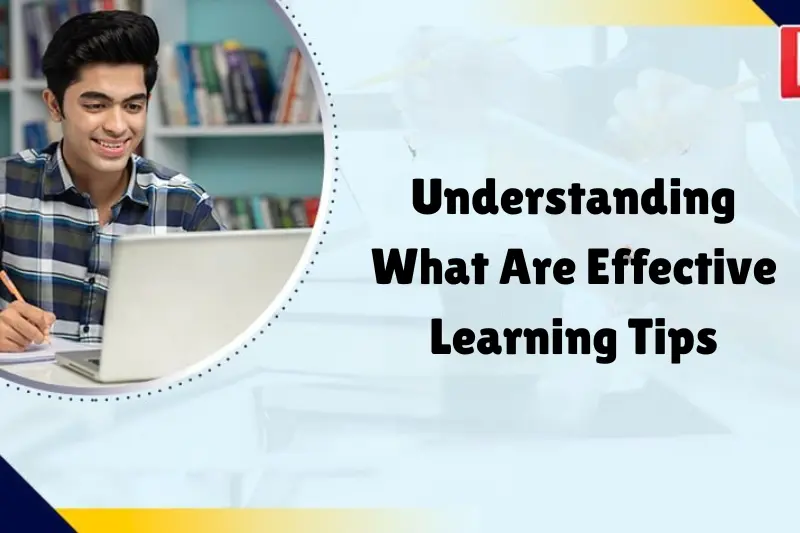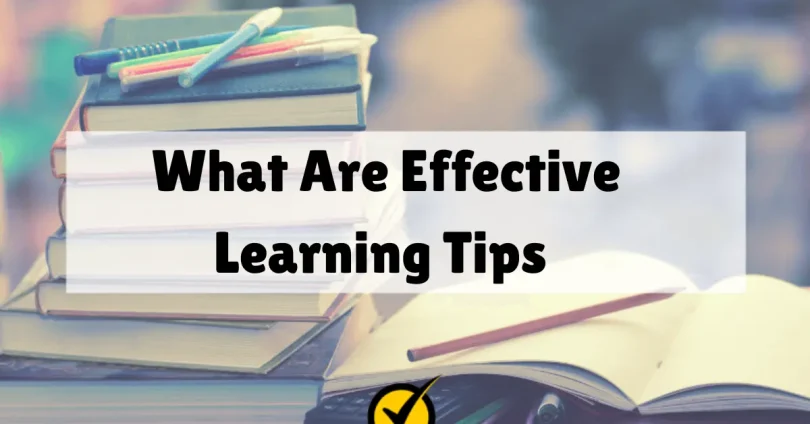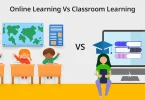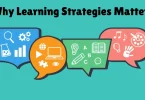Learning isn’t just about memorizing facts or scoring high on exams. True learning is about understanding, applying knowledge, and growing your skills over time. You might ask, what are effective learning tips that really work?
In this guide, we’ll explain them in a simple, practical way so you can improve your learning process, retain more information, and feel confident in any learning situation.
Understanding What Are Effective Learning Tips

So, what are effective learning tips exactly? These are strategies and techniques designed to help you learn more efficiently and meaningfully. They focus not only on passing exams but also on building long-term knowledge, improving problem-solving skills, and developing a growth mindset.
Effective learning is personal. It depends on your learning style, your ability to manage time, and the methods you use to study. For instance:
- Visual learners absorb information better through charts, diagrams, and color-coded notes.
- Auditory learners remember things through listening, discussions, and recordings.
- Kinesthetic learners prefer hands-on activities, experiments, and real-life practice.
Most people are a mix of learning types. Identifying your strengths is the first step in understanding what are effective learning tips and applying them successfully.
Common Mistakes That Prevent Effective Learning
Even the most dedicated students can struggle if they don’t study effectively. Recognizing common mistakes can help you avoid them:
- Unstructured study sessions: Studying without a plan can lead to wasted time and confusion.
- Distractions: Social media, noisy environments, and multitasking significantly reduce focus.
- Using the wrong learning methods: Applying methods that don’t match your learning style can make even simple concepts hard to grasp.
- Cramming at the last minute: Short-term memorization may help for exams, but it does not support long-term retention.
By avoiding these pitfalls, you can make the most of what are effective learning tips and create a study system that works for you.
Top Effective Learning Tips You Can Use Today

Here’s a detailed breakdown of what are effective learning tips to help you study smarter, not harder:
1. Know Your Learning Style
Understanding your learning style is essential. If you’re a visual learner, use charts, mind maps, and diagrams. Auditory learners benefit from listening to lectures, podcasts, or reading aloud. Kinesthetic learners should engage in hands-on activities or real-world applications. Knowing this helps you choose the right strategies for faster learning.
2. Create a Study Schedule
Time management is one of the most important factors in effective learning. Break your study sessions into focused intervals, like 25–50 minutes with short breaks in between (Pomodoro technique). A consistent schedule helps reduce stress, improve focus, and build a daily learning habit.
3. Use Active Learning
Active learning is the opposite of passively reading or highlighting. It involves interacting with the material:
- Summarize topics in your own words
- Teach concepts to someone else
- Ask questions and critically analyze information
These activities reinforce understanding and improve memory retention.
4. Minimize Distractions
Create a distraction-free environment for studying. Turn off notifications, choose a quiet space, and focus on one task at a time. Even small interruptions can break your concentration and reduce learning efficiency.
5. Practice Regular Review
Spaced repetition is a proven learning technique. Instead of cramming, review material regularly over days or weeks. This strengthens long-term memory and helps you recall information effortlessly during exams or practical situations.
6. Apply Real-Life Examples
Connecting what you learn to real-life situations makes information easier to understand and remember. For example, if you’re learning about statistics, try applying it to sports scores or daily expenses. Real-world connections make abstract concepts meaningful.
7. Stay Motivated and Positive
A positive mindset can make a huge difference. Celebrate small wins, set achievable goals, and remind yourself why learning matters. Curiosity and motivation make even challenging topics more approachable and enjoyable.
8. Take Care of Your Body and Mind
Effective learning is not just mental—it’s physical too. Proper sleep, healthy meals, regular exercise, and hydration improve focus and cognitive performance. Don’t underestimate the impact of well-being on your learning efficiency.
9. Use Technology Wisely
Apps, online courses, and educational platforms can complement your learning. Tools like flashcards, quizzes, and study trackers help reinforce concepts, track progress, and maintain consistency.
10. Reflect on Your Learning
Finally, take time to reflect. Ask yourself: “What worked well today? What could I improve?” Self-reflection helps you adjust strategies, understand your progress, and stay motivated.
11. Break Complex Topics into Smaller Parts
Big subjects can feel overwhelming. Break them into smaller chunks and focus on understanding one part at a time. This makes learning manageable and prevents frustration.
12. Use Mnemonics and Memory Tricks
Mnemonic devices, acronyms, rhymes, and visualization techniques can make remembering difficult concepts much easier. For example, “PEMDAS” helps in remembering the order of operations in math.
13. Mix Different Study Methods
Combine reading, writing, listening, and practicing. This multi-sensory approach reinforces learning and caters to mixed learning styles. For example, read a topic, watch a video, and then write a summary.
14. Practice Self-Testing
Test yourself regularly with quizzes, flashcards, or past papers. This helps you check your understanding, identify weak areas, and improves retention.
15. Study in Intervals and Take Breaks
Avoid long, continuous study sessions. Short, focused intervals with breaks (like 25–50 minutes of studying followed by a 5–10 minute break) improve concentration and prevent burnout.
16. Teach What You Learn
Explaining concepts to someone else is one of the most effective ways to reinforce knowledge. Teaching forces you to organize your thoughts and identify gaps in understanding.
17. Stay Curious and Ask Questions
Don’t just memorize—ask why and how things work. Curiosity leads to deeper understanding and helps retain information for longer periods.
18. Create Mind Maps or Visual Summaries
Mind maps, flowcharts, and diagrams help you organize information visually. This is especially helpful for visual learners and makes revision faster and more effective.
19. Keep a Learning Journal
Write down what you learn every day, including challenges and successes. Journaling helps with reflection, consolidates memory, and tracks progress over time.
20. Reward Yourself for Milestones
Set small goals and reward yourself after achieving them. Positive reinforcement boosts motivation and makes the learning process more enjoyable.
21. Stay Flexible and Adapt
Not every method works for everyone. Be open to trying new techniques and adapting based on what gives you the best results. Flexibility is key in understanding what are effective learning tips that truly work for you.
22. Join Study Groups or Discussions
Learning with others allows you to share perspectives, clarify doubts, and gain insights you might have missed. Active discussion enhances understanding and retention.
23. Focus on Understanding, Not Just Memorizing
Aim to grasp the underlying concepts rather than rote learning. When you truly understand a topic, recalling information becomes easier and more intuitive.
24. Use Real-World Applications
Apply theoretical knowledge in real-life scenarios. This bridges the gap between theory and practice and makes learning meaningful and memorable.
25. Prioritize Difficult Topics First
Tackle challenging subjects when your mind is fresh and more focused. Save easier or less critical topics for later in your study session.
You may also like to read this:
7 Types of Learning Methods For Students: A Complete Guide
How To Improve Study Habits: Tips For Smarter Learning
Why Learning Strategies Matter For Smarter Learning
10 Top Learning Tips For Exams To Boost Performance
Conclusion
So now you have a comprehensive list of what are effective learning tips to help you study smarter, retain more knowledge, and grow your skills confidently. By using these strategies—from understanding your learning style to applying real-world examples—you can transform your learning experience and achieve long-term success.
Remember: effective learning is a journey, not a race. Start implementing these tips today and notice the difference in your focus, confidence, and knowledge retention.
FAQs
1. What are effective learning tips for beginners?
Effective learning tips for beginners include understanding your learning style, creating a study schedule, minimizing distractions, and using active learning techniques like summarizing or teaching concepts to others.
2. How can I identify my learning style?
To identify your learning style, notice how you absorb information best. Visual learners prefer diagrams and charts, auditory learners benefit from listening, and kinesthetic learners learn through hands-on activities. Many people have a mix of styles.
3. Are there effective learning tips for memorization?
Yes! Use techniques like mnemonics, acronyms, flashcards, repetition, and visualization. Breaking information into smaller chunks and teaching it to someone else also improves memory retention.
4. How can I avoid distractions while studying?
Choose a quiet study space, turn off notifications, schedule short focused intervals, and take regular breaks. Using apps that block social media or distractions can also help.
5. What are effective learning tips for exams?
Focus on active learning, practice past papers, review regularly with spaced repetition, and prioritize difficult topics first. Combine different methods like reading, writing, and self-testing for better retention.





